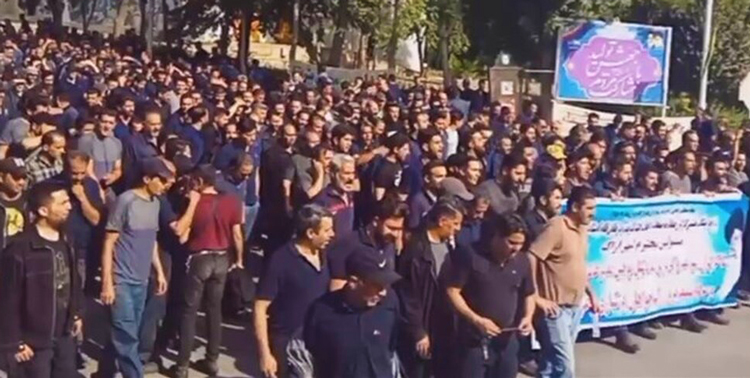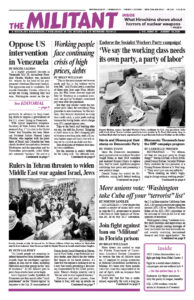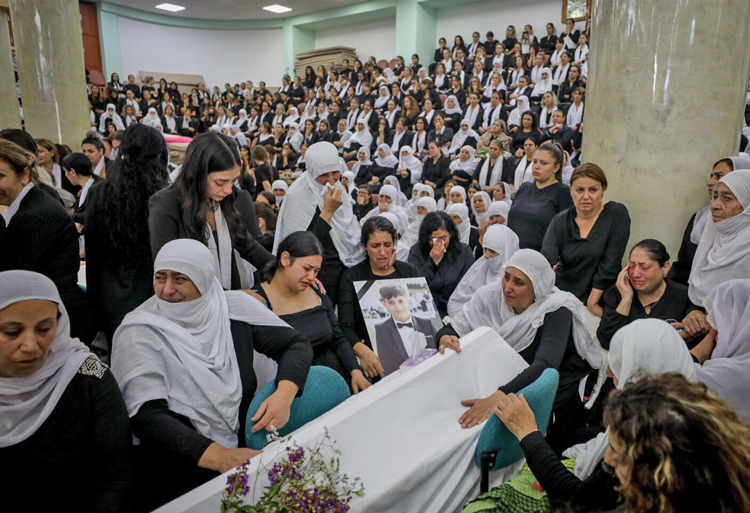The Israeli people are preparing to defend themselves from threatened new assaults from the reactionary capitalist regime in Iran and its allies, including Hezbollah and other groups in the “axis of resistance.” As the Militant goes to press these attacks have yet to begin.
Iran’s Supreme Leader Ayatollah Ali Khamenei said they would inflict “harsh punishment” on the “Zionist regime” in response to the July 31 assassination of Hamas leader Ismail Haniyeh in Tehran, and of Fuad Shukr, a top Hezbollah military leader, near Beirut the day before. But despite all the harsh rhetoric, it’s clear that the regime is looking to act in a way that avoids provoking a devastating counterattack by the Israeli government. Tehran’s foreign ministry said it “did not seek to raise regional tensions.”
Khamenei said Iran’s proxies, from Yemen to Iraq, will step up attacks on Israel and encouraged Hezbollah to attack deeper into Israel and deliberately target civilians. Since Oct. 8, Hezbollah has launched more than 6,000 drones and missiles at northern Israel to press Israel to end its war on Hamas in Gaza. They carried out a drone attack that wounded two Israeli soldiers Aug. 5.
The leaders of the Islamic Republic of Iran were stunned by the assassination of Haniyeh at one of the regime’s safe houses, which took place just hours after he had met with Khamenei. While Israeli leaders made no comment on the assassination, they took responsibility for the death of Shukr. They said it was retaliation for the killing of 12 Arab Druze children hit by a Hezbollah missile in the Golan Heights as they were playing soccer July 27.
President Joseph Biden was furious with Israeli Prime Minister Benjamin Netanyahu over the assassination, according to the New York Times and Israel’s Channel 12 news, alleging that Haniyeh’s death set back talks for a cease-fire in Gaza. Biden reportedly told Netanyahu in a heated phone call to “stop bullshitting me.”
But despite the White House’s ire, Washington sent F-22 jet fighters, an aircraft carrier strike group and other forces to the region to help shoot down missiles and drones if Iran retaliates.
National Security Council spokesman John Kirby told the press this was done “to help Israel defend itself and, frankly, defend our own people.” That’s a diplomatic way of saying that the U.S. military is there to defend U.S. imperialism’s interests in the region — not to defend the Jewish people or Israel’s right to exist as a refuge for Jews. A Tehran-allied militia had fired two missiles at the main U.S. military base in Iraq Aug. 5, injuring seven people.
Hamas’ history of Jew-hatred
The liberal bourgeois media, from the Times to the Washington Post, wrote about the death of Haniyeh as if he was just another diplomat, and about Hamas and Hezbollah as if they are political groups who simply have a conflict with Israel. They urge Washington to act as a neutral arbiter seeking to achieve peace by getting all sides to compromise.
The Post wrote that Haniyeh was “considered one of Hamas’s more politically pragmatic leaders.” The Times favorably quoted a Palestinian “think tank” saying Haniyeh was “politically savvy” and “quite a tactful leader.”

But Haniyeh was the leader of a group which openly calls for repeated pogroms in Israel until all Jews are either dead or gone. Hamas comes out of the Egypt-based Muslim Brotherhood, which joined Amin al-Husseini, the Grand Mufti of Jerusalem, in collaborating with the Nazis during World War II. They hoped to help bring about a Nazi victory that would allow them to complete Adolf Hitler’s “Final Solution” in the Middle East — the elimination of all the Jews.
Hamas showed its true colors by naming Yahya Sinwar, the mastermind of the Oct. 7 pogrom, to take Haniyeh’s place as head of its political bureau.
The 1988 founding covenant of Hamas explicitly calls for killing all the Jews and replacing Israel with a despotic caliphate. That is its purpose, whatever tactical decisions Hamas makes on who carries a weapon and who wears a suit and tie. Haniyeh was an enthusiastic booster of Hamas’ Oct. 7 pogrom in Israel, the biggest massacre of Jews since the Holocaust in World War II.
Jew-hatred and the destruction of Israel was at the heart of the foundation of Hezbollah as well. And that’s why the Israeli capitalist government has no choice but to force Hezbollah away from the Lebanese border, no matter what the White House wants.
Tehran calls for a meeting
Instead of an immediate attack, Tehran called for an “extraordinary” meeting in Saudi Arabia Aug. 7 of the Organization of Islamic Cooperation — which includes representatives of 57 governments — to discuss its fight against Israel. There will be opposition to Tehran there. The governments of Saudi Arabia and Jordan, while calling for a cease-fire in Gaza, have warned Tehran not to violate their airspace in any attack on Israel.
Moscow has begun sending advanced air defense systems and radars to Iran, which could make future Israeli attacks on Iranian military and nuclear sites riskier. The Vladimir Putin regime owes Iran’s rulers for their provision of drones for Moscow to use against the people of Ukraine.
But Moscow, like Washington, wants stability for its interests in the region. The Iranian press reported that Putin asked Khamenei to limit any retaliation against Israel to military targets and avoid harming civilians.
The biggest obstacle Tehran faces comes from the working people in Iran. Efforts by the regime to exhort support for their moves against Israel at soccer matches have been met with derision. Workers are mounting daily strikes and protests demanding higher wages and better working conditions.
In a reflection of growing sentiment against Tehran’s military adventures abroad, the Union of Truck Drivers of Iran posted the following message online July 10, underneath a picture of a pothole-ridden road. “We consider ourselves the leading power in the region and the Middle East, but we are unable to pave the route at the Bazargan [Turkey] border, an international transit passage, because the money and resources are spent on Lebanon, Palestine, Iraq, and other proxy groups.”


